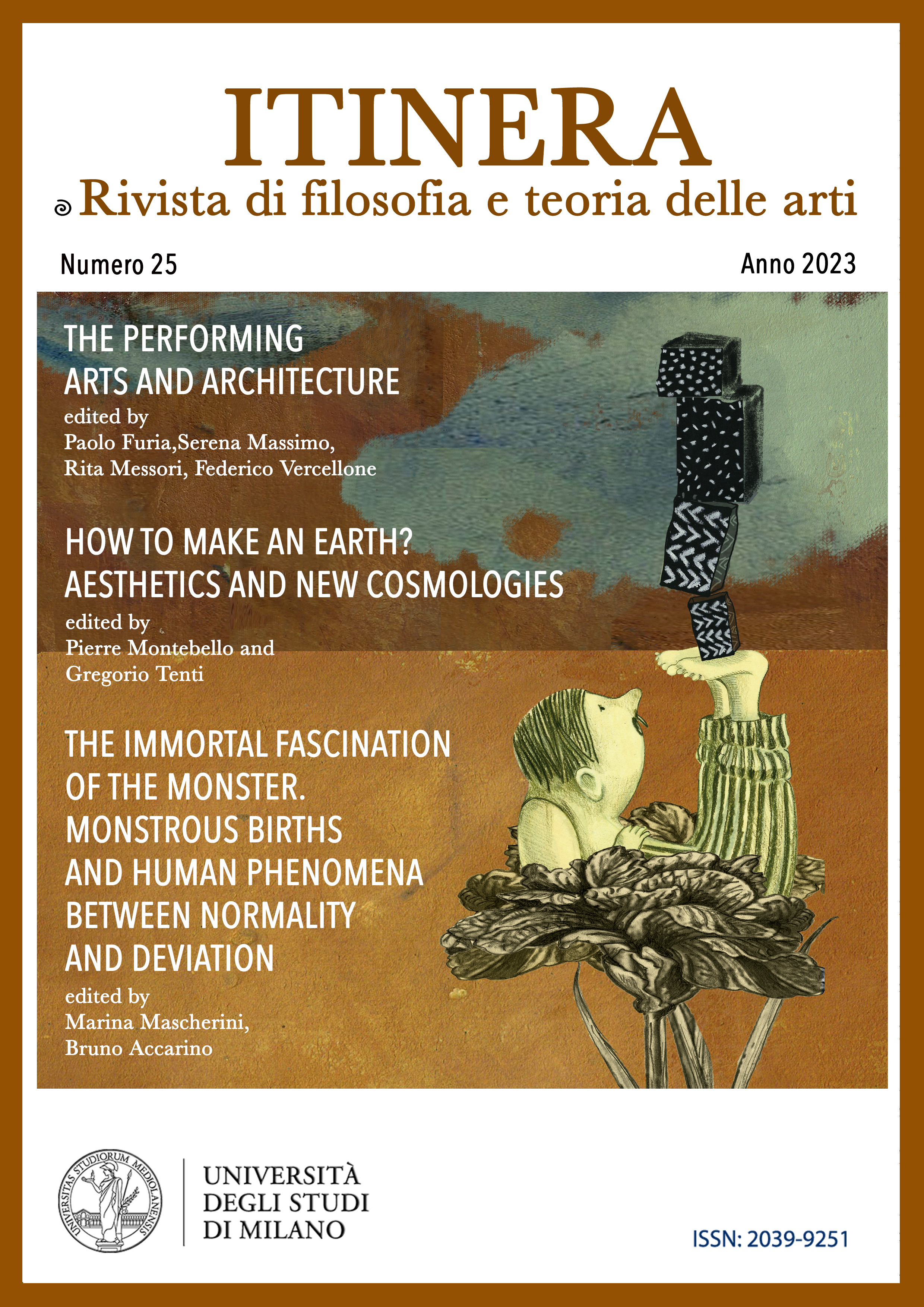Performativité et habitation urbaine: itinéraires sonores dans la fragilité globale
DOI:
https://doi.org/10.54103/2039-9251/20810Parole chiave:
performativity, soundscape, urbanisation, vulnerability, global conditionAbstract
This article aims to weave the fields of performativity, sound and urban living through philosophical itineraries that follow two motifs: mourning and vulnerability. Through Bonnie Honig's rereading of Antigone, we will trace the characters of a performative Antigone, who hybridises the fields of phoné and logos in her lament. We will then consider the example of contemporary mourning as well as the problem of urban soundscape spread by an ubiquitous technophony. We will address the motif of vulnerability starting from the work and research of Brandon Labelle, who will accompany us on sound walks where listening will emerge as a performative practice. Listening to urban space confronts us with a global and generalised vulnerability. By combining mourning and vulnerability, we will finally express the need for a performativity of fragility in our global condition.
Downloads
Riferimenti bibliografici
Aristote, Politique. Livres I et II, texte établi et traduit par J. Aubonnet, Les Belles Lettres, Paris 1960.
Budji, I. K., Utilizing Sounds of Mourning as Protest and Activism: The 2019 Northwestern Women’s Lamentation March Within the Anglophone Crisis in Cameroon, “Resonance”, 1 (4), 2020, pp. 443-461.
Butler, J., Antigone : La parenté entre vie et mort, trad. par G. Le Gaufey, Epel, Paris 2003.
Butler, J., Trouble dans le genre. Le féminisme et la subversion de l’identité, trad. par É. Fassin, La Découverte, Paris 2006.
Cavarero, A., Corpo in figure. Filosofia e politica della corporeità, Feltrinelli, Milano 1995.
Chakrabarty, D., The Climate of History in a Planetary Age, University of Chicago Press, Chicago-London 2021.
Chandola, T., I Wail, Therefore I am, in M. Gandy et B.J. Nilsen (éd. par), The Acoustic City, Jovis, Berlin 2014, p. 212-217.
Chandola, T., Listening into Others: an Ethnographic Exploration in Govindpuri, Institute of Network Cultures, Amsterdam 2020.
Descola, P, Par-delà nature et culture, Gallimard, Paris 2005.
van Dooren, T., et Bird Rose, D., Keeping Faith with the Dead: Mourning and De-extinction, “Australian zoologist”, 38 (3), 2017, p. 375-378.
Dupuy, J.-P., Pour un catastrophisme éclairé. Quand l’impossible est certain, Seuil, Paris 2002.
Dollfus, O., Système Mode et système Terre, in “L’Espace géographique”, vol. 21, n. 3, 1992, p. 223-229.
Dollfus, O., Le Système Monde, in R. Brunet et O. Dollfus, Mondes Nouveaux, coll. « Géographie universelle », Belin, Paris 2001.
Dollfus, O., La mondialisation, préface de J. Lévy, Presses de Sciences Po, Paris 2007.
Galabru, S., Paul Ricœur et Emmanuel Levinas : vulnérabilité, mémoire et narration : Peut-on raconter la vulnérabilité ?, “Études ricœuriennes”, 10 (1), 2019, p. 125-139.
Honig, B., Antigone, Interrupted, Cambridge University Press, Cambridge 2013.
Labelle, B., Acoustic Territories. Sound culture and everyday life, Continuum, New-London 2010
Labelle, B., Sonic Agency. Sound and Emergent Forms of Resistance, Goldsmiths Press, Cambridge (MA)-London 2018
Lafon, X., Marc, J.-Y., et Sartre, M., La ville antique. Histoire de l’Europe urbaine. I, sous la direction de J.L. Pinol, Seuil, Paris 2021
Latour, B., Nous n’avons jamais été modernes. Essai d’anthropologie symétrique, La Découverte, Paris 1991.
Louro, I., Mendes, M., Paiva, D., e Sánchez-Fuarros, I., A Sonic Anthropocene. Sound Practices in a Changing Environment, “Cadernos de Arte e Antropologia”, vol. 10, n. 1, p. 3-17.
Lussault, M., L’anthropocène comme urbanocène, in V. Disdier et M. Lussault (éd. par), Néolitihique-Anthropocène. Dialogue autour des 13 000 dernières années, Éditions 205, Lyon 2021, pp. 85-94.
Lussault, M., L’avènement du monde. Essai sur l’habitation humaine de la Terre, Seuil, Paris 2013.
Lussault, M., Hyper-lieux. Les nouvelles géographies de la mondialisation, Seuil, Paris 2017.
Meier, C., The Greek discovery of politics, trans. by D. McLintock, Harvard University Press, Cambridge-London 1990.
Merleau-Ponty, M., Le visible et l’invisible, Gallimard, Paris 1964.
Merleau-Ponty, M., L’institution. La passivité. Notes de cours au collège de France (1954-1955), Belin, Paris 2003.
Nancy, J.-L., À l’écoute, Galilée, Paris 2002.
Nussbaum, M., La fragilité du bien : Fortune et éthique dans la tragédie et la philosophie grecque, trad. par G. Colonna d’Istria et R. Frapet, Éditions de l’éclat, Paris 2016.
Papa, A., Antigone. Il diritto di piangere. Fenomenologia del lutto femminile, Vita e Pensiero, Milano 2019.
Power, N., Soft Coercion, the City, and the Recorded Female Voice, in M. Gandy et B. J. Nilsen (éd. par), The Acoustic City, cit., pp. 23-26.
Ricoeur, P., Soi-même comme un autre, Seuil, Paris 1990.
Steiner, G., Les Antigones, trad. fr. P. Blanchard, Gallimard, Paris 1986.
Sophocle, Antigone, vv. 909-915, trad. par J. Grosjean, Gallimard, Paris 2011.
Sueur, J., « Dans le silence du virus : quels effets sur les êtres vivants ? », in “The conversation”, March 24, 2020, en ligne, https://theconversation.com/dans-le-silence-du-virus-quels-effets-sur-les-etres-vivants-134073 (consulté le 10 avril 2023).
Thucydide, La guerre du Péloponnèse, II, XLIII, 2, trad. par J. Romilly, Les Belles Lettres, Paris 2009.
Dowloads
Pubblicato
Come citare
Fascicolo
Sezione
Licenza
Copyright (c) 2023 Gael Caignard

Questo lavoro è fornito con la licenza Creative Commons Attribuzione - Condividi allo stesso modo 4.0.
Gli autori che pubblicano su questa rivista accettano le seguenti condizioni:
1. Gli autori mantengono i diritti sulla loro opera e cedono alla rivista il diritto di prima pubblicazione dell'opera, contemporaneamente licenziata sotto una Licenza Creative Commons - Attribuzione - Condividi allo stesso modo 4.0 internazionale che permette ad altri di condividere l'opera indicando la paternità intellettuale e la prima pubblicazione su questa rivista.
2. Gli autori possono aderire ad altri accordi di licenza non esclusiva per la distribuzione della versione dell'opera pubblicata (es. depositarla in un archivio istituzionale o pubblicarla in una monografia), a patto di indicare che la prima pubblicazione è avvenuta su questa rivista.
3. Gli autori possono diffondere la loro opera online (es. in repository istituzionali o nel loro sito web) prima e durante il processo di submission, poiché può portare a scambi produttivi e aumentare le citazioni dell'opera pubblicata (Vedi The Effect of Open Access).





